Search Results
Search
Filter results
Advanced Filters
Your search returned 883 Solutions
-
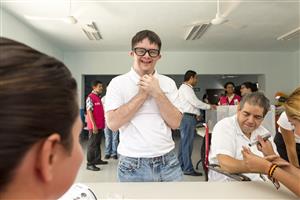
New guidelines are making Mexican elections accessible
The "Protocol for the Inclusion of People with Disabilities" is a binding national protocol. It contains requirements and guidelines for the availability of Braille ballots, improved physical access for people with mobility impairments, hospital polling stations as well as the reduction of both informative and communicative barriers.
Mexican National Electoral Institute, Mexico -
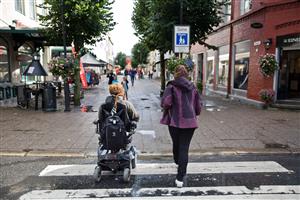
Personal assistance is custom-designed
Uloba, Independent Living Norway, is a cross-disability organization that has developed the concept of "personal assistance" based on the Independent Living ideology. Uloba is organized as a cooperative society owned by its members – all disabled. In 2015 Uloba had 1,100 members and 5,700 assistants.
Uloba – Independent Living Norge SA, Norway -
The ‘employer model’ in personal assistance
This project offers support for persons with disabilities who use personal assistants, and encourages them to organize these assistants themselves. After a certain period of time, the level of experience and self-confidence becomes strong enough for the "new employers" to continue managing their assistants on their own.
Rhein-Main inklusiv e.V., Germany -
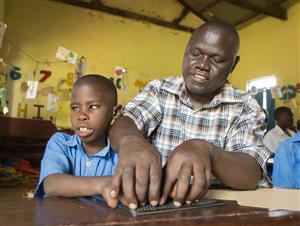
USDC advocates for inclusive education and modifies existing school environments. Schools are made accessible through different factors: teachers, children and parents are sensitised; assistive devices are provided; children with disabilities are integrated into society.
USDC supports schools in helping them to become accessible. It also empowers the parents of children with disabilities to advocate for inclusive policies and teachers are sensitised about disability. To ensure sustainability, USDC works within existing structures and partners with government and other service providers.
Uganda Society for Disabled Children, A fully inclusive and accessible school in Uganda, Uganda -
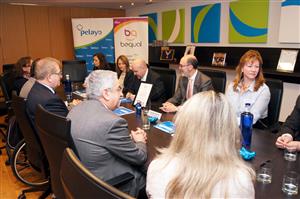
A voluntary certificate for organizations willing to commit to CSR and disability
CSR-D is the first certificate on disability endorsed by people with disabilities themselves. The certificate is structured in 7 categories with 19 indicators. Employment of people with disabilities is a central element. 2012 to 2016 nine external auditors with disabilities were licensed and 134 companies were certified.
Bequal Foundation, Bequal Certificate on Corporate Social Responsibility and Disability (CSR-D), Spain -
Broad Integration in the labour market
Local and national campaigns like "Sprawni w Pracy", which means "Able at Work", have drawn Polish society’s attention to the situation of people with disabilities and their low level of employment. Friends of Integration also assists people in finding employment by operating five Integration Centres.
Friends of Integration Association, Broad Integration in the labour market, Poland -
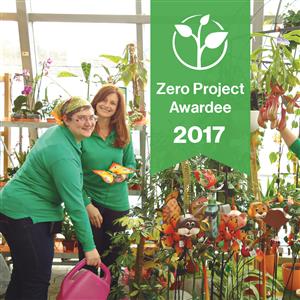
Full-service package leading to employment in the open labour market
Between 2004 and 2016, ChancenForum has supported 120 people with disabilities during their integration into the open labour market by providing them with job coaching, mentoring, and contacts with approximately 100 companies. The jobs offer a regular labour contract as well as the same benefits as their non-disabled peers.
autArk Social Services, ChancenForum, Austria -
Child Development Monitoring for Rural Areas
Yayasan Suryakanti Bandung is a non-profit foundation that specializes in supporting infants and children at high risk for disability through early detection and intervention in rural areas of Indonesia. To that end, it established the Suryakanti Foundation Centre. From 2014 to 2016 approximately 18,000 patients were served.
Suryakanti Foundation Center, Child development monitoring for rural areas, Indonesia -
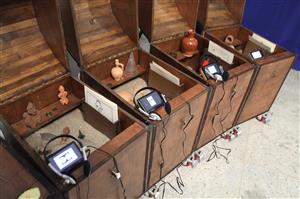
Training museum professionals in the Western Balkans to improve access to their buildings, collections and activities for persons with disabilities and enabling positive participation while challenging negative stereotypes.
Training for professionals working in museums are at the heart of the project. A information and education program is also provided to raise awareness for the persons with disabilities. Children and adults are welcomed as visitors and take part in various activities which enable them to experience their cultural heritage.
Cultural Heritage without Borders, Communicating art in the Western Balkans, Sweden -
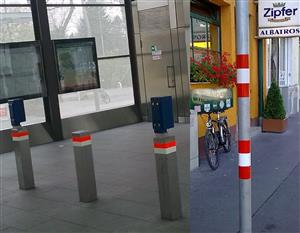
This research project provides a comprehensive list of barriers in public transport systems and convenient solutions for vision and hearing impaired passengers. Authorities and public transport companies can use the results to improve their services.
This research project provided an initial comprehensive list of barriers together with convenient solutions that should be considered for a barrier-free public transport system. The database provides approx. 300 best & worst practices (with photographs) as a toolkit to design barrier-free transport systems.
WU - Vienna University of Economics and Business, Database for barrier-free public transport systems, Austria
- Page 1
- Page 2
- Page 3
- Page 4
- Page 5
- Page 6
- Page 7
- Page 8
- Page 9
- Page 10
- Page 11
- Page 12
- Page 13
- Page 14
- Page 15
- Page 16
- Page 17
- Page 18
- Page 19
- Page 20
- Page 21
- Page 22
- Page 23
- Page 24
- Page 25
- Page 26
- Page 27
- Page 28
- Page 29
- Page 30
- Page 31
- Page 32
- Page 33
- Page 34
- Page 35
- Page 36
- Page 37
- Page 38
- Page 39
- Page 40
- Page 41
- Page 42
- Page 43
- Page 44
- Page 45
- Page 46
- Page 47
- Page 48
- Page 49
- Page 50
- Page 51
- Page 52
- Page 53
- Page 54
- Page 55
- Page 56
- Page 57
- Page 58
- Page 59
- Page 60
- Page 61
- Page 62
- Page 63
- Page 64
- Page 65
- Page 66
- Page 67
- Page 68
- Page 69
- Page 70
- Page 71
- Page 72
- Page 73
- Page 74
- Page 75
- Page 76
- Page 77
- Page 78
- Page 79
- Page 80
- Page 81
- Page 82
- Page 83
- Page 84
- Page 85
- Page 86
- Page 87
- Page 88
- Page 89